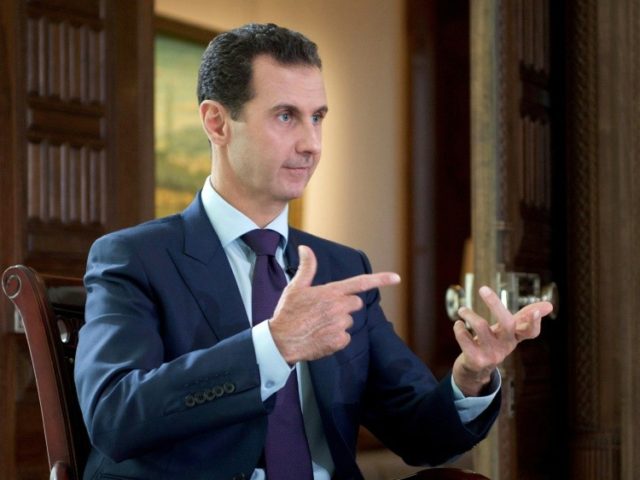Syrian dictator Bashar al-Assad, in an interview published Tuesday, issued his first remarks since the United States elected Donald Trump its next president. Assad told the Portuguese outlet RTP TV Trump’s attitude towards Syria was “promising” and suggesting Trump may be a “natural ally” to Syria, Iran, and Russia.
The interview, published in English in full by the Syrian state outlet SANA, touches on a variety of topics – from the relevance of the United Nations to Assad’s own reported human rights violations, to the role America can play in ending the five-year-old civil war. Assad’s remarks on Trump remain the newsiest part of the interview, however, as he uses it to repeat his widely-known anti-American beliefs, while also acknowledging that Trump has promised a less interventionalist policy than his competitors.
“We don’t have a lot of expectations because the American administration is not only about the President; it’s about different powers within this administration, the different lobbies that they are going to influence any President,” Assad answered in response to his expectations of the Trump White House. “So, we have to wait and see when he embarks his new mission, let’s say, or position within this administration as President in two months’ time. But we always say we have wishful thinking that the Unites States would be unbiased, respect the international law, doesn’t interfere in other countries around the world, and of course to stop supporting terrorists in Syria.”
Asked whether he is ready to work with Trump if he offers to cooperate against the Islamic State in Syria, Assad says “of course.” “I would say this is promising, but can he deliver?… for us it’s still dubious whether he can do or live up to his promises or not,” he added, noting that the Syrian government was “very cautious” about trusting Trump. Assad particularly noted that Trump’s prior lack of experience in office makes it difficult to predict how he will function as president.
“If he is going to fight the terrorists, of course we are going to be ally, natural ally in that regard with the Russian [sic], with the Iranian [sic], with many other countries who wanted to defeat the terrorists,” Assad concluded.
In the same interview, Assad openly discusses the “important” role Iran, the leading global state sponsor of terrorism, and Hezbollah, Iran’s largest terror proxy, are playing in supporting his military.
The interviewer reiterated his question on whether Assad could see him working with the U.S. “Of course,” Assad replied.
As a candidate, Trump expressed a willingness to remain neutral regarding Syria and watch the parties currently embroiled in the war fight it out. “You look at what’s going on with ISIS in there, now think of this: we’re fighting ISIS. ISIS wants to fight Syria. Why are we fighting ISIS in Syria? Let them fight each other and pick up the remnants,” he said in September 2015.
“I love the fact that ISIS is being hit by Russia,” Trump remarked that same month, a comment that raised many questions given the fact that, while Russian President Vladimir Putin had vowed to enter the Syrian fray to attack the Islamic State, Russia has largely refrained from targeted ISIS-held areas, helping Assad massacre the moderate opposition in northern regions like Aleppo and Homs, instead. A month after these remarks, a study found that 80 percent of Russian airstrikes in Syria were not targeting ISIS.
This week, Russia and Damascus announced a new offensive in eastern Aleppo, a region with no known Islamic State presence. After reportedly sending civilians a text warning that remaining in their homes will result in certain death, Russian jets began bombarding the city.
In the September 2015 interview, Trump asserted that Assad was a “bad guy” who “killed hundreds of thousands of people,” but he hesitated to support the resistance to Assad because “we don’t know who they are… we don’t even know who we’re backing.”
Assad mentioned the support for these rebel groups in Tuesday’s interview. “When you talk about cooperation, it means cooperation between two legal governments, not cooperation between foreign government and any faction within Syria,” he said, specifically about the cooperation between Washington and Syrian Kurdish militias. “Any cooperation that doesn’t go through the Syrian government is not legal. If it’s not legal, we cannot cooperate with, and we don’t recognize and we don’t accept.”
Asked about remarks by Vice President-elect Mike Pence, who has argued for greater force against Assad to protect civilians in Aleppo, Assad delivered the anti-American vitriol typical of his regime:
This is against the international law again, and that’s the problem with the American position; they think that they are the police of the world. They think they are the judge of the world; they’re not. They are sovereign country, they are an independent country, but this is their limit; they don’t have to interfere in any other country. Because of this interference for the last fifty years, that’s why they are very good only in creating problems, not in solving problems. That’s the problem with the American role. That’s why I said we don’t pin a lot of hopes of changing administrations because that context has been going on for more than fifty years now, and that’s expected. If they want to continue in the same position of the United States creating problems around the world, that’s what they have to do: only interfering in the matters of other nations.
While many observers of the U.S. presidential election expressed concern that Trump appeared willing not to intervene in Syria, his predecessor Barack Obama did little to prevent the current humanitarian disaster in the nation. President Obama reestablished diplomatic relations with Assad shortly after his own election – and shortly before the civil war began – and actively pursued ways to circumvent Congressionally-mandated sanctions against Assad.

COMMENTS
Please let us know if you're having issues with commenting.